The Economics of Air Transport.
Page 40

If you've noticed an error in this article please click here to report it so we can fix it.
ON the broad grounds of practical economics, transport by air is more favourably placed than is any other form. The most expensive is rail, because of its need for a costly and exclusive permanent way and all that appertains thereto. Road transport comes next in the descending scale, because its permanent way is the road, and as a community must have roads it must contribute to their cost, and thus pave the way for savings in this form of transport.
Water transport is much cheaper than either of these two, suffering only from low speed and lack of the essential medium. An indication of the comparative economy of water transport is embodied in the fact that practically the whole capital invested in the world's mercantile marine hardly exceeds that of a single British railway company.
Air transport is in a much better situation. The air is everywhere and costs nothing. The machines are comparatively cheap, and with the increasing use of alternative fuels, the cost of operation is falling. This form of transport suffers from only one limitation : that of the capacity of the individual unit—a passing phase. That disadvantage is to a great extent offset by the considerable benefit which is conferred by Its much higher speed. It is a branch of transport which is hound to develop rapidly in the near future. The figures relating to air transport for the past year—one of economic depression as great as has ever been known—indicate, nevertheless, a steady growth, a circumstance which is a happy augury for air-transport prosperity in the better times now beginning. The surest foundation is in a full appreciation of the necessity of knowledge of operating costs, and it Is in that belief that we introduce, with this issue, a series of articles dealing in a practical manner with that most essential aspect of,.air transport.












































































































